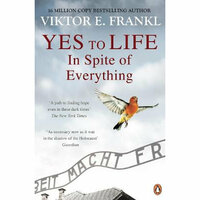Take a photo of a barcode or cover
Frankl explores some ideas in this book I think everyone would benefit from reading, especially in these times. I loved the last essay in particular. Unfortunately, as someone who volunteers in suicide pre and postvention, I found his takes on suicide outdated and dismissive. Really left a bad taste in my mouth, which I found disappointing
challenging
emotional
inspiring
medium-paced
challenging
dark
hopeful
informative
inspiring
reflective
tense
fast-paced
I was between a 4/5 on this book (felt like there may have been some issues with the way it was translated). However, it’s incredible to think this was put together from Frankl’s lectures given only months after being liberated. Similar to other reviewers, under the circumstances, you’d think this would be more grim, but it’s filled with themes of hope throughout. This made me want to go back and re-read Man’s Search for Meaning.
“Our life takes on meaning through our actions, through loving, and through suffering.”
“And in spite of everything, no human suffering can be compared to anyone else's because it is part of the nature of suffering that it is the suffering of a particular person, that it is his or her own suffering-that its "magnitude" is dependent solely on the sufferer, that is, on the person; a person's solitary suffering is just as unique and individual as is every person.”
“Our life takes on meaning through our actions, through loving, and through suffering.”
“And in spite of everything, no human suffering can be compared to anyone else's because it is part of the nature of suffering that it is the suffering of a particular person, that it is his or her own suffering-that its "magnitude" is dependent solely on the sufferer, that is, on the person; a person's solitary suffering is just as unique and individual as is every person.”
hopeful
inspiring
reflective
medium-paced
hopeful
inspiring
reflective
fast-paced
dark
emotional
informative
tense
fast-paced
A book comprising three lectures given by psychotherapist Frankl following the WW2, only months after his release from the concentration camps. Frankly had been devoted before the war to helping affirm the value of life and prevent suicide, and had a book dedicated to his ideas and therapies sewn into the lining of his coat when he was taken to the camps. This was destroyed, however, along with everything else Frankl had been living for. So, now what kept him alive? He continued to essentially test his theories on life and meaning throughout his time in the camps - facing the atrocities, the apathy, the attempt to male like and meaning “nothing”. The title of this book - Yes to Life - comes from a song the prisoners sang in the midst of it all. The lectures then deal with the meaninglessness of suicide and the spiritual resources required to let life insist in the face of suffering; the evils of forced annihilation; and the concentration camps themselves. These are vital works, particularly, I found, the discussion on suicide - even physician-assisted suicide - the notion of which horrified Frankl. This book also addresses the nihilistic view that is so prevalent in our modern thinking, and affirms the importance of each individual life.
challenging
dark
emotional
hopeful
informative
inspiring
reflective
medium-paced
informative
inspiring
reflective
slow-paced


